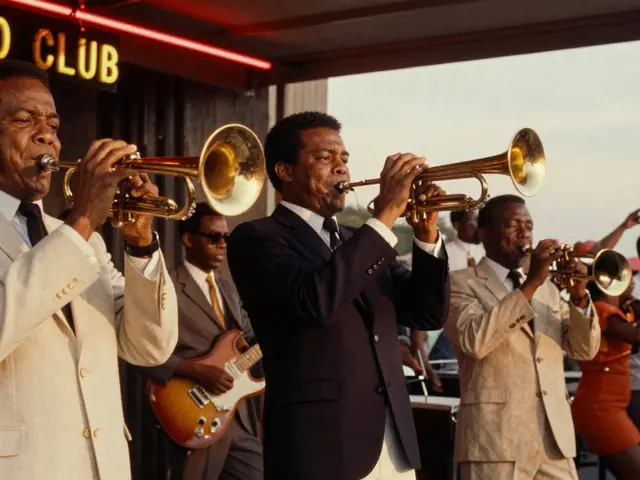The Essence of Soul Music: A Journey Through Its Roots and Impact
When we think about soul music, we instinctively feel the depth and emotion it carries. It's a genre that transcends mere musical notes, reaching deep into the heart and often, reflecting the collective experiences of African American communities. This music genre, which emerged in the 1950s and 1960s, is an amalgamation of gospel, rhythm and blues (R&B), and jazz, and it has played a pivotal role in the cultural and spiritual life of its listeners.
What sets soul music apart is its emphasis on vocal expressiveness, the depth of its lyrics, and its ability to touch the core of our being. Artists like Aretha Franklin, Otis Redding, and Sam Cooke didn't just sing; they poured their hearts out, telling stories of love, pain, joy, and resilience. Soul music speaks to the struggles and hopes of its time, narrating the tale of civil rights, freedom, and the desire for a better world.
The essence of soul music goes beyond entertainment. It serves as a mirror reflecting the societal changes and challenges, becoming a source of comfort and inspiration for many. Its impact is profound, offering solace and joy, acting as a glue that binds communities, and serving as a beacon of hope in times of despair. The emotional honesty of soul music is what makes it timeless and universal. It resonates with people across different walks of life, providing a refuge for the soul.
Healing Through Harmony: The Therapeutic Benefits of Soul Music
It's no secret that music holds therapeutic powers. Numerous studies have shown how music can alleviate stress, reduce anxiety, and even improve physical health. However, soul music, with its rich emotional spectrum and deep lyrical content, has a unique place in music therapy. It's like a balm for the soul, capable of lifting spirits and healing emotional wounds.
Listening to soul music can be a profoundly moving experience. It encourages self-expression, fosters a sense of belonging, and promotes emotional release. It's not just about listening to the music; it's about feeling it, letting the melodies and words wash over you, and finding solidarity in the shared human experiences it conveys. This form of emotional release can have significant therapeutic effects, helping to navigate through life's ups and downs with grace and resilience.
Engaging with soul music doesn't just involve passive listening. It invites active participation, be it through singing along, dancing, or simply tapping your feet to the beat. This active engagement stimulates the brain, releasing endorphins and creating feelings of pleasure and euphoria. Further, the storytelling aspect of soul music promotes empathy and understanding, helping listeners to feel less isolated in their experiences.
Integrating Soul Music into Your Daily Life for Spiritual Revival
Incorporating soul music into your daily routine can have transformative effects on your emotional and spiritual well-being. Whether it's starting your day with an uplifting soul playlist, using soul music as a backdrop for meditation, or turning to soulful melodies during difficult times, this genre offers an expansive toolkit for self-care and spiritual revival.
Create a personalized soul music playlist that speaks to your heart, selecting songs that resonate with your current emotional state. This could include uplifting anthems to boost your mood or soothing ballads to calm your mind. Experiment with incorporating soul music into different aspects of your daily life, like during exercise, while cooking, or as a way to unwind before bed. Pay attention to how different songs affect your mood and energy levels, and adjust your playlist accordingly.
Attending live soul music performances or participating in community music events can also enhance your connection to the music and its healing power. There's something magical about experiencing soul music live, surrounded by others who share your appreciation. It fosters a sense of community and collective joy that can be deeply nourishing for the soul.
Leveraging the Power of Soul Music for Personal Growth and Healing
Embracing soul music as part of your journey towards personal growth and healing requires an openness to the messages and emotions conveyed through the songs. It's about more than just enjoying the music; it's about engaging with its essence, allowing it to touch you, move you, and inspire you.
Reflect on the lyrics, paying attention to the stories and emotions they express. Many soul songs are rich in wisdom, offering insights and reflections that can guide you through personal challenges and growth. Allow yourself to be vulnerable, to feel the full range of emotions soul music evokes, and use these experiences as stepping stones for emotional healing and growth.
Ultimately, the healing power of soul music lies in its ability to connect us—to our own emotions, to each other, and to a larger human experience. It acts as a conduit for expression, empathy, and understanding, offering a path towards spiritual revival and personal transformation. By integrating soul music into our lives, we harness a powerful tool for navigating the complexities of the human condition, finding solace and joy in its rhythms and melodies.






